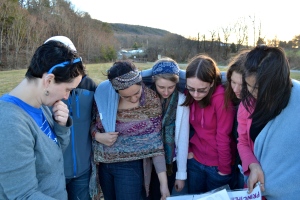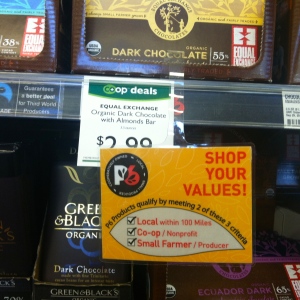A blog post reflection written by Aynah’s summer intern, Meredith Bruster, a junior at Luther College and a leader in Luther’s Aynah chapter.
Inspired. Experiences at the ACE Institute and USA Cooperative Youth Council Youth Cohort
“Alone we can do so little, together we can do so much.”
-Helen Keller
Cooperation, as voiced by Helen Keller, proves essential to enacting impactful change. To understand how the cooperative model offers opportunities to foster change, one must look to cooperative education. The Association of Cooperative Educators Institute and USA Cooperative Youth Council both gathered cooperative members, educators, and activists through shared learning about the cooperative movement in exchange of resources for shared education about cooperatives. This blog post explores cooperative education experiences among youth and cooperative educators by promoting future intergenerational collaboration, youth leadership, values-based relationships and inclusive spaces. Collectively, these values foster a culture of cooperation.
Inspired by vision and driven by values, these passion-evoking cooperative education experiences offered insight on leadership, teamwork and personal development by means of seven learning points that I can apply as an chapter leader and as a young leader in the co-op movement.
TOP SEVEN LEARNING POINTS
- Icebreakers offer fundamental opportunities to energize and refocus
o Icebreakers are activities that begin to help the group unite as a team. Icebreakers can be a simple and fun way to promote group bonding and check in. Whether group members are or are not familiar with each other, creating opportunities for group members to get to know each other and refocus will promote group relationships and teamwork.
- Gauge, communicate and ask about needs at the beginning
o Begin an activity, meeting, or event by asking about individual needs. Whether needs are physical or emotional, communicating needs at the beginning is very important to fostering an open and inclusive space in which the group can grow. For example, at the end of the CYCs several individuals mentioned feeling tired. Orientation facilitators responded to this feedback by shortening the session to provide the group with extra time to recharge. In this instance, adapting the agenda to meet the needs of the group demonstrated respect for individuals’ time and energy levels, and helped foster an environment in which people communicate their needs.
- Engage with different learning styles
o In one session we learned about four different learning styles: visual, auditory, kinesthetic and demonstration. According to Esteban Kelly, a worker-owner of AORTA and a co-director of the US Federation of Worker Cooperatives, only 10% of auditory information is retained. Many people learn best by seeing, moving and practicing—or a combination of all three. By engaging in different learning styles, presenters, teachers and leaders can involve the group right away and provide for more opportunities for individuals to learn.
- Learn about the communities in which you would like to work
o Expressing interest and taking the time to learn about the communities allows the project to become collaborative and relevant. Without expressing interest and willingness to learn, building sustained relationships and joining together to create positive change is not possible.
- Structure conversations around values
o Networking is all about making connections between people—these connections are often more successful when individuals share their values and find meaningful ways to connect these values to a vision. Avoid listing accomplishments, projects, and goals. Effective networking begins with reflecting upon personal values and discovering ways to connect personal values, passions, experiences, and future aspirations
- Search for alternative ways to explain concepts
o Some words or concepts, such as “cooperative”, may be stigmatized, offensive or misunderstood by certain groups. Finding alternative ways to explain to explain key concepts and teach to the group may provide more opportunities for individuals to stay focused and learn without diverting attention to “road block” words and phrases.
- Collaborate through communication of shared vision and values
o Vision and values develop from within, however, true positive and impactful change takes root when individuals join together in shared values and vision.
Truly, the CYC cohort and ACE members who attended the ACE institute embody the energy, passion and values of cooperation. With newfound energy and relationships to guide our path, Aynah can collaborate with other educators in the cooperative movement—and together we can do so much.




 Day 3: Woke up for a morning meeting with the student president of Spartan Global and unpacked some excellent partnership ideas related to ways that Aynah can support their microfinancing of cooperatives abroad. An afternoon exploration of East Lansing led me to the
Day 3: Woke up for a morning meeting with the student president of Spartan Global and unpacked some excellent partnership ideas related to ways that Aynah can support their microfinancing of cooperatives abroad. An afternoon exploration of East Lansing led me to the  ay 4: Exploration of Ann Arbor (#nomeetings)! Lots of reconnaissance for a potential Aynah trip here someday, though. We’d have loads of visits to choose from including the
ay 4: Exploration of Ann Arbor (#nomeetings)! Lots of reconnaissance for a potential Aynah trip here someday, though. We’d have loads of visits to choose from including the  Day 6: Workshop day! 12 students show up to
Day 6: Workshop day! 12 students show up to  Day 8: My morning meeting with a graduate student from China started with some confusion about two buildings having the same name (#outoftowner). She’s inspired by Aynah and wants to come on our trips and build capacity for a chapter at Purdue. This felt like the kind of capacity building that we’re looking for – international connections and inspired students. I spent the afternoon at Greyhouse, an affiliate of
Day 8: My morning meeting with a graduate student from China started with some confusion about two buildings having the same name (#outoftowner). She’s inspired by Aynah and wants to come on our trips and build capacity for a chapter at Purdue. This felt like the kind of capacity building that we’re looking for – international connections and inspired students. I spent the afternoon at Greyhouse, an affiliate of